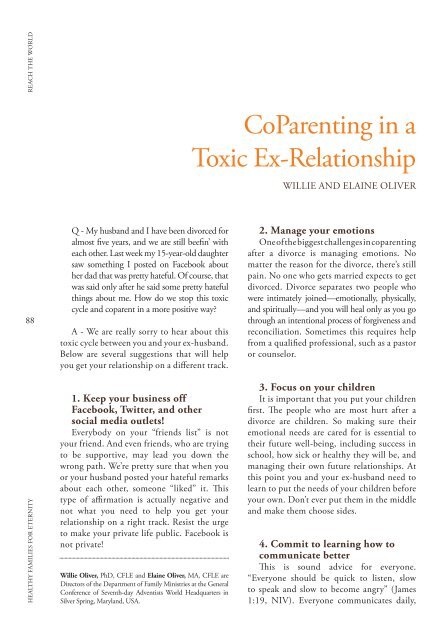HEALTHY FAMILIES FOR ETERNITY
FM_Planbook%202016-eng
FM_Planbook%202016-eng
Create successful ePaper yourself
Turn your PDF publications into a flip-book with our unique Google optimized e-Paper software.
<strong>HEALTHY</strong> <strong>FAMILIES</strong> <strong>FOR</strong> <strong>ETERNITY</strong> REACH THE WORLD<br />
88<br />
Q - My husband and I have been divorced for<br />
almost five years, and we are still beefin’ with<br />
each other. Last week my 15-year-old daughter<br />
saw something I posted on Facebook about<br />
her dad that was pretty hateful. Of course, that<br />
was said only after he said some pretty hateful<br />
things about me. How do we stop this toxic<br />
cycle and coparent in a more positive way?<br />
A - We are really sorry to hear about this<br />
toxic cycle between you and your ex-husband.<br />
Below are several suggestions that will help<br />
you get your relationship on a different track.<br />
1. Keep your business off<br />
Facebook, Twitter, and other<br />
social media outlets!<br />
Everybody on your “friends list” is not<br />
your friend. And even friends, who are trying<br />
to be supportive, may lead you down the<br />
wrong path. We’re pretty sure that when you<br />
or your husband posted your hateful remarks<br />
about each other, someone “liked” it. This<br />
type of affirmation is actually negative and<br />
not what you need to help you get your<br />
relationship on a right track. Resist the urge<br />
to make your private life public. Facebook is<br />
not private!<br />
Willie Oliver, PhD, CFLE and Elaine Oliver, MA, CFLE are<br />
Directors of the Department of Family Ministries at the General<br />
Conference of Seventh-day Adventists World Headquarters in<br />
Silver Spring, Maryland, USA.<br />
CoParenting in a<br />
Toxic Ex-Relationship<br />
WILLIE AND ELAINE OLIVER<br />
2. Manage your emotions<br />
One of the biggest challenges in coparenting<br />
after a divorce is managing emotions. No<br />
matter the reason for the divorce, there’s still<br />
pain. No one who gets married expects to get<br />
divorced. Divorce sepa rates two people who<br />
were intimately joined—emotionally, physically,<br />
and spiritually—and you will heal only as you go<br />
through an intentional process of forgiveness and<br />
reconciliation. Sometimes this requires help<br />
from a qualified professional, such as a pastor<br />
or counselor.<br />
3. Focus on your children<br />
It is important that you put your children<br />
first. The people who are most hurt after a<br />
divorce are children. So making sure their<br />
emotional needs are cared for is essential to<br />
their future well-being, including success in<br />
school, how sick or healthy they will be, and<br />
managing their own future relationships. At<br />
this point you and your ex-husband need to<br />
learn to put the needs of your children before<br />
your own. Don’t ever put them in the middle<br />
and make them choose sides.<br />
4. Commit to learning how to<br />
communicate better<br />
This is sound advice for everyone.<br />
“Everyone should be quick to listen, slow<br />
to speak and slow to become angry” (James<br />
1:19, NIV). Everyone communicates daily,


